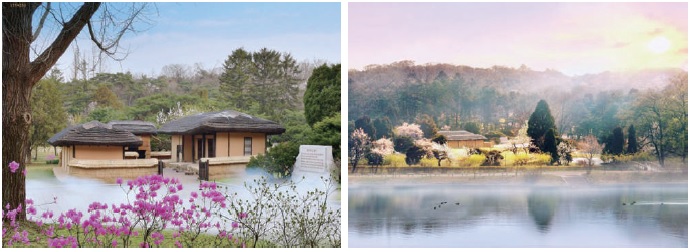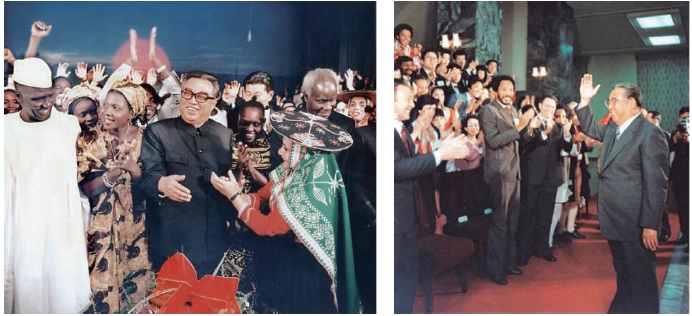無價的財富
無價的財富
Priceless Wealth
Many people in the world think money is everything. But there is something that cannot be bought or exchanged with money. It is noble ideology and spirit.
President Kim Il Sung (1912-1994) regarded noble ideology and spirit as the most precious wealth of revolutionaries.
For him, money and material wealth are meaningful only for the people’s welfare. He never linked money or wealth with his life.
Although he devoted his all to the victory of the Korean revolution and the cause of global independence shouldering the heavy burden of state affairs, he refused all the proposals of the officials to raise his salary.
The following story is a good example.
In November 1993, a meeting for accounting and income distribution was held at the Wonhwa Cooperative Farm, Phyongwon County, South Phyongan Province.
The meeting adopted a resolution on presenting 102 485 won to Kim Il Sung who was an honorary member of the farm. It was the sum of the savings of the share of Kim Il Sung who had worked for the farm since the time of the cooperativization of socialist agriculture after the Korean war (1950-1953). He had striven to boost the farm since the day when he had sowed seeds together with the farmers during the war. It was an expression of their gratitude for his devoted efforts.
But Kim Il Sung ensured that tractors, trucks and farming machines were purchased with the money for the farm.
There is the International Friendship Exhibition House in Mt Myohyang, which is famous for its superb scenic beauty.
Displayed there are numerous precious gifts presented to President Kim Il Sung by party leaders, personages, organizations and institutes of various countries of the world.
President Kim Il Sung never thought that the gifts were for him alone. He said that all the gifts for him belonged to the country, not to him and so they must be displayed in the exhibition house.
In general, politicians do not make public the gifts they received. Regarding them as an expression of their personalities and dignity, they keep and use them for themselves. It is common that they make them a source of pride in their personalities even when they show them to others.
But President Kim Il Sung turned all the gifts presented to him into the wealth of the country and the people which will be handed down generation after generation.
Native Home of President Kim Il Sung
There is a humble house at the foot of Mangyong Hill which has been famous for its beautiful scenery from olden times. It is the native home of President
Kim Il Sung, whom the New York Times highly praised as the hero of the heroes of the 20th century.

Memory of Tolstikov
Vladimir Tolstikov was a famous Russian journalist and a public figure. He did not forget President Kim Il Sung until he got 90 years of age.
Being Fascinated
Tolstikov came to know about Kim Il Sung in the mid-20th century, when the Soviet-German war was at its height.
At that time the Soviet publications used to carry articles about victorious battles waged by the Korean anti-Japanese guerrilla units.
They wrote that the Korean guerrillas had started anti-Japanese armed resistance in the beginning of the 1930s, much earlier than the outbreak of the Soviet–German War, and were playing important role in frustrating the Japanese imperialists’ attempt to invade the Soviet Union by striking them from the rear.
The Commander of the guerrillas was General Kim Il Sung.
Kim Il Sung’s ennobling internationalist ideal of defending the Soviet Union, the world’s first socialist state, with arms, and the self-sacrificing struggle of the Korean guerrilla units moved Tolstikov and many other Russians.
A documentary film he saw in the base near Khabarovsk in the summer of 1942 left an unforgettable impression upon him.
The scene of the ceremony commemorating the formation of the International Allied Forces (of Koreans, Chinese and Soviets), showed Kim Il Sung inspecting the march-past of the IAF together with Apanasenko, Commander of the Soviet Far East Forces and other military officers.
He was really surprised to know that such a famous legendary guerrilla hero of the East was in his twenties.
What surprised him in particular was Kim Il Sung’s courage in declaring a war against the million-strong Japanese imperialist forces and his strategic initiative of forming an international allied forces.
He could have a better understanding of Kim Il Sung when he worked in Pyongyang from 1952 as the representative of the Press Bureau of the Soviet Union and the correspondent of the Russian newspaper Pravda.
He was deeply impressed by Kim Il Sung who went as far as the forefront at the risk of his life to encourage the soldiers and people and command the operations of the entire front.
The tactics Kim Il Sung applied during the Korean war including those in the battle for liberation Taejon, a requisite for the students of the Frunze Military Academy as an example of modern encirclement warfare, and in the Jumunjin naval warfare where the KPA Navy achieved a worldwide military miracle of sinking the US heavy cruiser Baltimore with four torpedo boats, were not found in the military textbooks of the East and the West.
Tolstikov was struck with admiration for Kim Il Sung who went over the master plan for the reconstruction of Pyongyang with confidence in victory when the war was still going on.
During the days when he was recording the scenes of the ceasefire agreement of the Korean war being concluded in July 1953, he could take the historical picture of Kim Il Sung, clad in the white marshal’s uniform, signing the ceasefire document.

True Image
Tolstikov wrote in his memoirs:
I can say that I was also attracted by Kim Il Sung’s clairvoyant wisdom, stratagem and foresight, in other words, his greatness as a political leader.
Kim Il Sung seen by him as a witness of the 20th century full of events was a person strong in anti-imperialist independent stand and political faith.
He met Kim Il Sung in early February, 1968, when he was working on the Central Committee of the Communist Party of the Soviet Union. At that time the situation on the Korean peninsula grew so tense following the capture of the US armed spy ship Pueblo by the KPA Navy that a war might break out at any moment.
The United States brought in huge forces including a nuclear aircraft carrier around the Korean peninsula and demanded that the DPRK apologize and return the Pueblo.
They even threatened to use atomic bombs if the DPRK did not do so.
But Kim Il Sung responded with resolute declaration that his country would retaliate against any “retaliation” and return all-out war for an “all-out war.” The entire planet was shaken.
Driven into a tight corner by Kim Il Sung’s unexcelled pluck and ingenious politico-military stratagem, the US had to kneel down and send a letter of apology to the DPRK.
And Pueblo became an everlasting “POW” of the DPRK.
The incident of US spy plane EC-121 and the Panmunjom incident that occurred subsequently were also good examples which showed the international community how Kim Il Sung defended genuine peace and sovereignty.
Through these dramatic incidents Tolstikov saw the true image of Kim Il Sung as a standard-bearer of the cause of global independence and defender of justice.

Eternal Life
Kim Il Sung always warmly welcomed Tolstikov, an ordinary foreign correspondent, and treated him as his friend for scores of years.
It is no wonder Tolstikov used to recall his special relations with Kim Il Sung with pride.
He said that Kim Il Sung had protected him from the enemy bombs and shells during the Korean war and led him to become a spokesman of justice and truth.
In his memoirs he wrote that his last work he could do for President Kim Il Sung and the Korean people as well as many Russians who still kept the feelings of friendship and love of them would be to let the next generation know the achievements and personality of Kim Il Sung.
And he added that the bright image of Kim Il Sung would live in his heart and the hearts of the mankind for ever.
In his letter to the inaugural meeting of the preparatory committee for celebrating the 100th birth anniversary of President Kim Il Sung held in 2010 in Copenhagen, Denmark, he wrote that Kim Il Sung was an outstanding politician produced in the 20th century and that the world people prayed for his immortality in acknowledgement of his great exploits for the socialist cause and the cause of global independence.

Source: Consulate General of the Democratic People’s Republic of Korea in Hong Kong
- Log in to post comments





